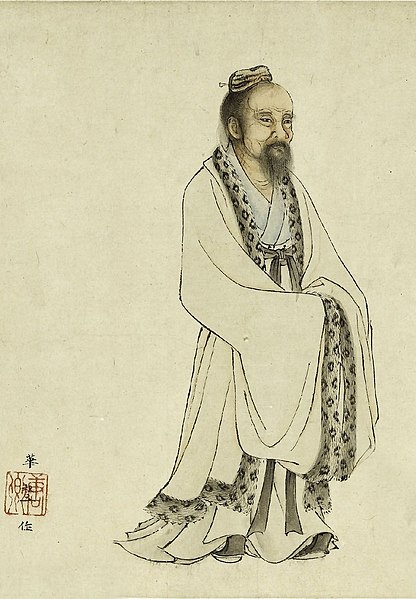Chinese food therapy is a mode of dieting rooted in Chinese beliefs concerning the effects of food on the human organism, and centered on concepts such as eating in moderation. Its basic precepts are a mix of Taoist Wuxing theory and concepts drawn from the modern representation of traditional Chinese medicine.
The Shiliao Bencao stated that many parts of the wild boar could be used therapeutically. Boar gallstones, powdered and decocted, could cure epidemics. Boar teeth, burnt to ashes and ingested, could alleviate the symptoms of snakebites. And refined boar fat taken with cereal wine could help nursing women produce more milk.
In religious Daoism and traditional Chinese medicine, yangsheng, refers to various self-cultivation practices aimed at enhancing health and longevity. Yangsheng techniques include calisthenics, self-massage, breath exercises, meditation, internal and external Daoist alchemy, sexual activities, and dietetics.
Reconstructed drawings from the 168 BCE Daoyin tu (Chart for Guiding and Pulling [Qi Circulation]) in the Mawangdui Silk Texts
Manuscript written on bamboo strips, from the Kongzi Shilun (孔子詩論), an early discussion of the Classic of Poetry, Warring States period (c. 475-221 BCE)
Original silk fragments of the 168 BCE Daoyin tu (Chart for Guiding and Pulling [Qi Circulation]) in the Mawangdui Silk Texts
Zhuang Zhou, Yuan dynasty painting, 14th century


![Reconstructed drawings from the 168 BCE Daoyin tu (Chart for Guiding and Pulling [Qi Circulation]) in the Mawangdui Silk Texts](https://upload.wikimedia.org/wikipedia/commons/thumb/a/a5/Daoyin_tu_-_chart_for_leading_and_guiding_people_in_exercise_Wellcome_L0036007.jpg/640px-Daoyin_tu_-_chart_for_leading_and_guiding_people_in_exercise_Wellcome_L0036007.jpg)

![Original silk fragments of the 168 BCE Daoyin tu (Chart for Guiding and Pulling [Qi Circulation]) in the Mawangdui Silk Texts](https://upload.wikimedia.org/wikipedia/commons/thumb/a/ac/Qigong_taiji_meditation.jpg/640px-Qigong_taiji_meditation.jpg)
